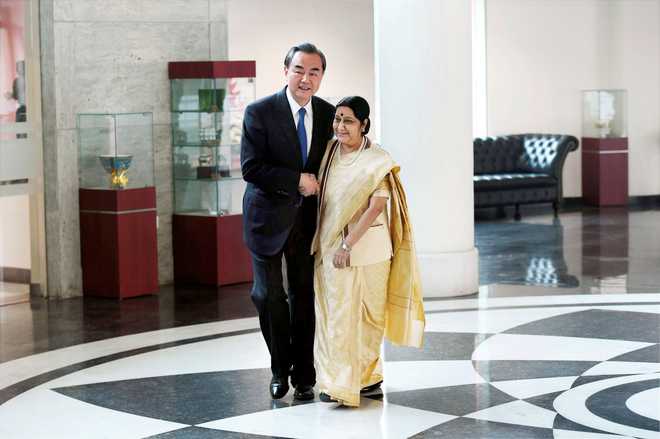
Minister for External Affairs Sushma Swaraj and her Chinese counterpart Wang Yi. — PTI.
Smita Sharma
Tribune News Service
New Delhi, December 14
Differences have emerged over India and China’s projection of what transpired in the bilateral meeting between Sushma Swaraj and Foreign Minister Wang Yi on Monday.
The two had met on the sidelines of the Russia-India-China (RIC) trilateral in New Delhi. Interestingly, while the Chinese Ministry of Foreign Affairs website carries official statements on the RIC meet and a separate one on Wang Yi’s meeting with National Security Adviser (NSA) Ajit Doval, there is no press release on the meeting with Sushma Swaraj, while the Ministry of External Affairs (MEA) put out a clarification about the said release.
“During the meeting between the External Affairs Minister and Chinese Foreign Minister Wang Yi on December 11 in New Delhi, the issue of Doklam was raised. EAM and Chinese Foreign Minister both noted the challenge it had posed to the relationship and both expressed satisfaction that it was resolved with the disengagement of troops at the face-off site through concerted diplomatic communications,” said the MEA.
(Follow The Tribune on Facebook; and Twitter @thetribunechd)
“Wang Yi conveyed that the peaceful resolution of the Doklam issue reflected the political maturity on both sides. While agreeing with this, the EAM reiterated that the maintenance of peace and tranquillity in the border areas is an essential pre-requisite for the smooth development of bilateral relations,” the release further added.
The MEA clarification was put out following press reports that attributed blunt remarks to Wang Yi saying Doklam had put Sino-Indian ties under ‘severe pressure’ and claimed Doklam as a victory. Press reports cited a release by China saying, “The viciousness caused by the cross-border infiltration of the Indian border guards put bilateral relations under severe pressure. The matter was finally settled peacefully through diplomatic means, reflecting the maturing of bilateral relations. However, lessons should be learned and it should not happen again.”
The Chinese Embassy has not responded to queries if this was an official release and if this had been taken down from the ministry’s website and why.
The MEA in its response said, “The EAM also underlined the need for approaching our differences with due consideration to each other’s sensitivities and concerns.”
The official press release on Wang Yi’s meeting with Doval that is still there on Beijing’s foreign ministry website says, “The two countries should particularly strengthen strategic communication, enhance strategic mutual trust and properly control and handle problems left over by history and some specific issues in bilateral relations by putting them in the right place of China-India relations, without politicising and complicating them to hamper the overall development of China-India relations.”



























